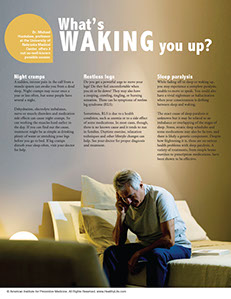SYMPTOM CHECKER
CONDITIONS
Male
Female
Child
Arm, Hand & Shoulder Concerns
Legs & Feet Concerns
Dental & Mouth Concerns
Ear & Nose
Eye Conditions
Head Conditions
Arm, Hand & Shoulder Concerns
Legs & Feet Concerns
Front
Back
Arm, Hand & Shoulder Concerns
Dental & Mouth Concerns
Ear & Nose
Eye Conditions
Head Conditions
Arm, Hand & Shoulder Concerns
Dental & Mouth Concerns
Ear & Nose
Eye Conditions
Head Conditions
Front
Back
Arm, Hand & Shoulder Concerns
Neck Links
Head & Neck Concerns
Arm, Hand & Shoulder Concerns
Neck Links
Head & Neck Concerns
Front
Back
Online Clinic
Wise Healthcare
What’s waking you up?

Print on Demand
Dr. Michael Huckabee, professor at the University of Nebraska Medical Center, offers 3 not-so-well-known possible causes:
Night cramps
A sudden, intense pain in the calf from a muscle spasm can awake you from a dead sleep. Night cramps may occur once a year or less often, but some people have several a night.
Dehydration, electrolyte imbalance, nerve or muscle disorders and medication side effects can cause night cramps. So can working the muscles hard earlier in the day. If you can find out the cause, treatment might be as simple as drinking plenty of water or stretching your legs before you go to bed. If leg cramps disturb your sleep often, visit your doctor for help.
Restless legs
Do you get a powerful urge to move your legs? Do they feel uncomfortable when you sit or lie down? They may also have a creeping, crawling, tingling, or burning sensation. These can be symptoms of restless leg syndrome (RLS).
Sometimes, RLS is due to a health condition, such as anemia or to a side effect of some medications. In most cases, though, there is no known cause and it tends to run in families. Daytime exercise, relaxation techniques and other lifestyle changes can help. See your doctor for proper diagnosis and treatment.
Sleep paralysis
While fading off to sleep or waking up, you may experience a complete paralysis, unable to move or speak. You could also have a vivid nightmare or hallucination when your consciousness is drifting between sleep and waking.
The exact cause of sleep paralysis is unknown but it may be related to an imbalance or overlapping of the stages of sleep. Stress, erratic sleep schedules and some medications may also be factors, and there is likely a genetic component. Despite how frightening it is, there are no serious health problems with sleep paralysis. A variety of treatments, from simple home exercises to prescription medications, have been shown to be effective.
This website is not meant to substitute for expert medical advice or treatment. Follow your doctor’s or health care provider’s advice if it differs from what is given in this guide.
The American Institute for Preventive Medicine (AIPM) is not responsible for the availability or content of external sites, nor does AIPM endorse them. Also, it is the responsibility of the user to examine the copyright and licensing restrictions of external pages and to secure all necessary permission.
The content on this website is proprietary. You may not modify, copy, reproduce, republish, upload, post, transmit, or distribute, in any manner, the material on the website without the written permission of AIPM.
2021 © American Institute for Preventive Medicine - All Rights Reserved. Disclaimer | www.HealthyLife.com
















































